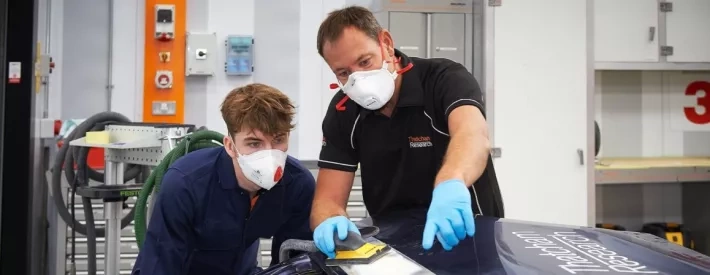Inside Thatcham Research: boosting skills and vehicle sustainability

As automotive shifts into a new era of mobility and skills partnerships become increasingly important to maintain the sector’s success. The IMI has a long history of working with a number of businesses and organisations that, together, make navigating challenges easier.
Over 30 years Thatcham Research, the automotive risk intelligence company,
has worked with the IMI to deliver important value to the industry. For example, it was the first delivery partner of Automotive Technician Accreditations for the body repair sector, the first training provider to develop Mechanical, Electrical and Trim and Vehicle Damage Assessor EPA standards with the IMI, and they continue to make notable contributions to the Accident Repair and Glazing Sector Advisory Group, chaired by the IMI. It’s for these reasons Thatcham was named IMI's Partner of the Year 2024 at the IMI’s Annual Awards.
Dean Lander Head of Repair Sector Services at Thatcham says: “We’re two extremely aligned organisations seeking very similar outcomes. Thatcham supports an independent repair sector, ensuring capability is there to safely reinstate vehicles and mitigate loss for insurers. And the IMI from its membership and sector skills position establishing the standards, standardisation, working protocols that Thatcham very much supports.”
Skills are at the heart of Thatcham’s work. As Lander says, the organisation run’s probably the largest body repair-specific footprint for training activities in the UK, and all of its programmes are aligned with IMI accreditations and qualifications.
“That's been the case for as long as I can remember, and we've been training for 30-plus years with that alliance in mind,” he says.
Thatcham continues to innovate in accessible digital learning. Thatcham has also made use of ecademy, their online training platform, and Microsoft Teams.
And with its new ‘espire’ CPD training product, Thatcham has prioritised its understanding of different learning styles. For example, CPD content in ‘espire’ combines audio (voiced by the technical trainer) and the written word, to support different types of learner. The content in ‘espire’ is also highly interactive and visual, again to promote engagement from different types of learners.
Facing challenges
Thatcham, like others, is well aware of the skills shortage in automotive, and a long with its adaptable approach to training, is also trying to help the industry plug the skills gap.
“We’re very conscious of a major skills crisis across automotive. It's now reached the point where we're joint top for vacancies, which is a real challenge. Thatcham has for the last two to three years really leaned into this challenge for the repair sector.
“We've invested in increasing our capacity in apprenticeships and we will continue to follow that investment path to ensure that the market has ample opportunity to take on apprentices.
“We work with other organisations like AutoRaise, which is a charity set up to try and bring the apprentices to the body shops, and we will continue to do so. I think any key message on this is if you're suffering from the skills crisis and you're within the sector, both Thatcham and the IMI are here to help, reach out,” says Lander.
But people and skills aren’t the only things in Lander’s inbox, Thatcham is also working with new manufacturers coming into the market to guarantee vehicles meet requirements and is safe and sustainable.
Lander says: “Manufacturers from China, Vietnam, and India are seeing the UK and European markets as a very tangible propositions. [We’re doing] a lot of work with the Chinese manufacturers to help them build cars that are insurable and more predictable. If the car's more predictable, if we can rate it properly, our insurers understand the risk that they're underwriting, they can write more realistic policies.
“If we can use the relationship to acquire more accurate repair data and repair competence into the independent repair market, these cars ultimately become more sustainable. If they can be repaired, they can be given back to the owner in a reinstated position.
The customer's ultimately happy because they're getting realistic insurance values, a really good high-quality car, and they're getting a car that's safe, secure, and sustainable.”
Thatcham’s work to bring more people into the industry, keep skills up to date, and make sure the vehicles on our roads, old and new, are as safe and sustainable as possible is incredibly important. And part of its success is down to working with partners across the industry, including its long-standing relationship with the IMI.




